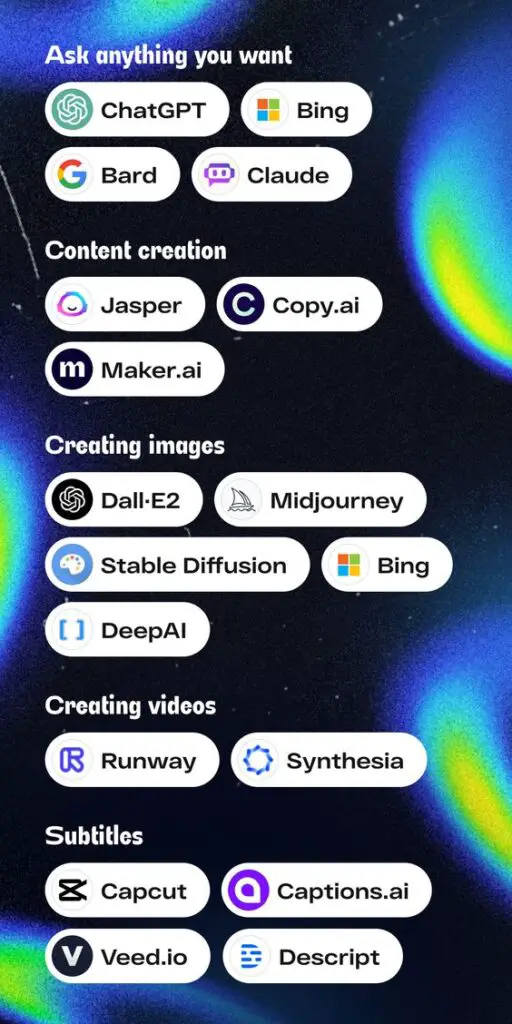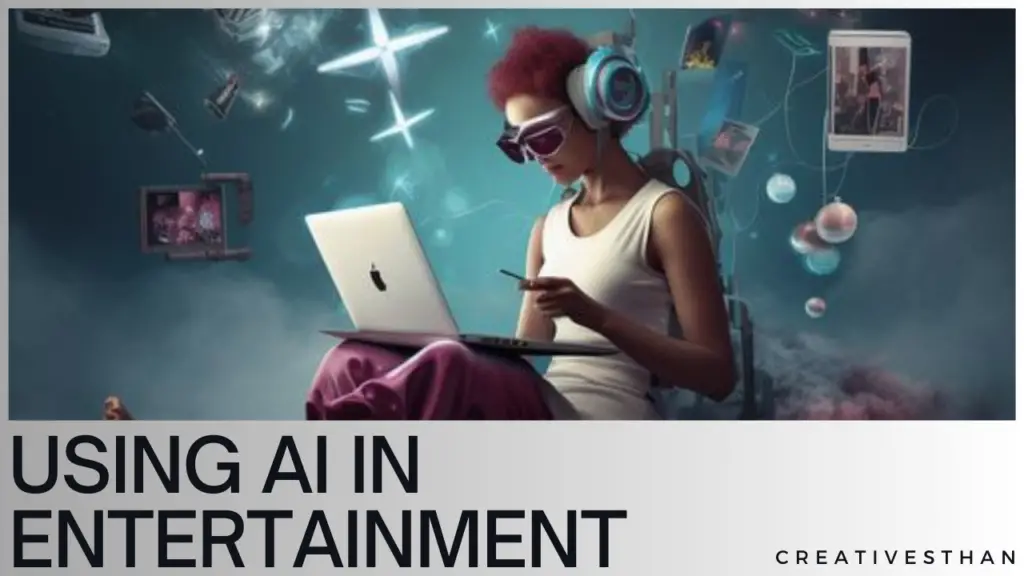Welcome to a captivating journey into the world of AI in entertainment. In this blog post, we’ll explore how artificial intelligence is revolutionizing the industry and reshaping the future of media. From content creation to audience engagement, AI’s transformative capabilities are empowering the entertainment sector like never before.
The Rise of AI in Entertainment
As AI gains momentum, it’s making its presence felt in the entertainment sector. Discover how AI-driven algorithms analyze extensive data sets to provide invaluable insights to content creators.
This data-driven approach allows them to make informed decisions, resulting in highly tailored and engaging experiences for audiences.
Transforming Content Creation and Personalization

Prepare to be amazed as we delve into how AI is transforming content creation in entertainment. Explore groundbreaking advancements, such as AI-generated scripts that fuel imaginative storytelling and automated video editing that streamlines production processes.
Witness how AI’s creative potential enhances personalization, bringing audiences closer to the content they love. You can check out the above image, Use these amazing AI content creation tools to boost your social media account.
Amplifying Audience Engagement
AI is changing the game when it comes to audience engagement. Discover how AI-powered algorithms drive personalized recommendations on streaming platforms, ensuring viewers discover relevant and captivating content.
Dive into the world of interactive experiences, where AI-driven chatbots and virtual assistants make entertainment consumption a truly immersive and interactive affair.
Case Study

How AI-Powered Recommendations Revolutionized a Streaming Platform
Introduction:
In this case study, we’ll explore how an AI-powered recommendation system transformed the user experience on a popular streaming platform, providing personalized content suggestions and driving higher viewer engagement. By leveraging AI algorithms, this platform was able to revolutionize how audiences discover and consume entertainment.
Background:
The streaming platform in focus had a vast library of movies, TV shows, and original content. However, users often faced the challenge of sifting through an overwhelming amount of options to find content that matched their interests. To address this, the platform decided to implement an AI-powered recommendation system.
Implementation:
The platform gathered data on user preferences, viewing habits, and feedback. This data was fed into AI algorithms that analyzed patterns, identified similarities between users, and learned from their interactions with the platform. The AI algorithms used a combination of collaborative filtering, content-based filtering, and machine learning techniques to generate personalized recommendations for each user.
Personalized Recommendations:
The AI-powered recommendation system proved to be a game-changer. Users now receive a tailored homepage showcasing a curated selection of content based on their interests, previous viewing history, and demographic information. The platform harnessed the power of AI to understand individual preferences and surface content that aligned with users’ tastes, thereby significantly enhancing the user experience.
Improved User Engagement:
With personalized recommendations, users spent less time searching for content and more time engaging with the platform. The AI algorithms took into account various factors, including genre preferences, similar titles enjoyed by users with similar tastes, and trending content, ensuring that users were presented with a diverse and relevant range of options.
The streaming platform also implemented a “Recommended for You” section, prominently featuring content tailored to each user. This feature increased user engagement and encouraged them to discover new shows and movies they may have overlooked otherwise.
Continuous Learning and Refinement:
The AI-powered recommendation system didn’t stop at its initial implementation. The platform constantly collected feedback and data on user interactions to refine its algorithms. User ratings watch history, and even user-provided feedback on the recommendations were taken into consideration. The system adapted and learned from user responses, enabling it to deliver even more accurate and personalized content suggestions over time.
Business Impact:
The implementation of AI-powered recommendations yielded significant results for the streaming platform. User engagement and retention rates increased, as users found it easier to discover content aligned with their preferences. This, in turn, led to longer viewing sessions and increased customer satisfaction. The platform also experienced a surge in subscriptions, as positive word-of-mouth spread among users who appreciated the personalized and relevant recommendations.
Conclusion:
This case study showcases the transformative power of AI-powered recommendations in the entertainment industry. By leveraging AI algorithms to analyze user data and deliver personalized content suggestions, the streaming platform was able to revolutionize the way audiences discover and consume entertainment. The implementation of the AI-powered recommendation system resulted in improved user engagement, increased customer satisfaction, and ultimately, business growth for the platform.
This example highlights how AI can empower entertainment platforms to provide tailored experiences, enhancing user satisfaction and driving success in a competitive industry.
Unleashing Creativity and Inspiring Innovation
Prepare to be inspired as we explore the unprecedented ways AI unleashes creativity and innovation in entertainment. Witness how AI-generated music compositions push artistic boundaries and how Deepfake technology adds a fascinating layer to film and television. As AI fuels innovative storytelling techniques, we’re witnessing a renaissance in the entertainment industry.
Addressing Challenges and Ethical Considerations
While AI in entertainment presents remarkable opportunities, we must address challenges and ethical considerations. Delve into topics like data privacy, algorithm bias, and the potential impact on industry employment. It’s crucial to navigate these issues responsibly and proactively to ensure a fair and inclusive future for all.
The Future of AI in Entertainment
Peer into the horizon and glimpse the future of AI in entertainment. Explore emerging technologies like augmented reality, virtual reality, and AI-assisted storytelling. Uncover the exciting possibilities that lie ahead, and how these innovations will transform how we consume and engage with media.
Conclusion
The era of AI in entertainment has arrived, and it’s reshaping the future of media in awe-inspiring ways. Embracing this technology unlocks unparalleled potential for personalization, creativity, and innovation. As we navigate the challenges and ethical considerations, it’s imperative to envision a future that fosters inclusivity and responsible use of AI.
Join us on this transformative journey as we unleash the power of AI in entertainment. Together, we’ll shape an extraordinary future where entertainment knows no bounds.
FAQs
What does “AI in entertainment” refer to?
AI in entertainment refers to the application of artificial intelligence technologies within the entertainment industry. It encompasses various areas such as content creation, personalized recommendations, audience engagement, and immersive experiences. AI is revolutionizing entertainment by enabling more efficient production processes, enhancing user experiences, and driving innovation in storytelling and creative expression.
How does AI help in entertainment?
AI in entertainment helps by enhancing content creation, delivering personalized recommendations, deepening audience engagement, improving production efficiency, providing data-driven insights, and enabling immersive experiences.
Examples of AI in entertainment?
AI in entertainment examples include:
1. AI-generated scripts and storylines in film and television.
2. Personalized content recommendations on streaming platforms like Netflix and Spotify.
3. Chatbots and virtual assistants for interactive experiences during live events or in gaming.
4. AI-driven video editing tools that automate and enhance post-production processes.
5. Deepfake technology is used for realistic visual effects and character transformations.
6. AI-powered music composition tools that create original compositions in various styles.
7. Augmented reality (AR) and virtual reality (VR) experiences in gaming and immersive storytelling.
8. AI-based animation and motion capture techniques for realistic character movements.
9. Sentiment analysis of audience feedback to gauge reactions and make data-driven decisions.
10. AI-powered voice recognition and natural language processing for voice-controlled entertainment experiences.
What are the disadvantages of AI in entertainment?
Disadvantages of AI in entertainment include job displacement, algorithm bias, data privacy concerns, creative limitations, ethical dilemmas, and overreliance on algorithms.
How is AI used in movies?
AI is used in movies for visual effects, post-production, script analysis, audience insights, casting and character creation, marketing and promotion, and distribution and recommendation.




